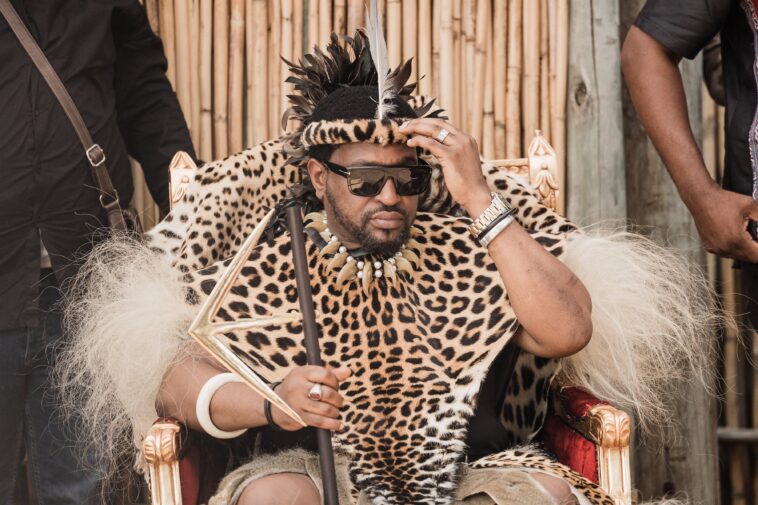Experts are divided on the impact of this week’s ruling on Misuzulu Zulu, but say it shows that South Africa has not yet learned how to handle the country’s traditional customs. The 49-year-old king’s older brother, Prince Simakade, was behind the latest royal showdown.
Simakade sought the ruling by the Pretoria High Court which said that President Cyril Ramaphosa was “unlawful” to recognise the king at an elaborate ceremony in October 2022.
The court ordered Ramaphosa to set up an investigation into whether Misuzulu Zulu’s tumultuous accession was in line with customary laws.
“Only once [the committee has] completed their thorough study of the judgment will a determination on the way forward be made,” Ramaphosa’s spokesperson said.
Mysterious deaths
The monarch’s office said in a statement that the king would also be “studying the judgment” with his legal team and senior members of the royal family. They would be “applying their minds as to the correct course of action”.
Misuzulu Zulu was named after King Goodwill Zwelithini died in 2021 at the age of 72. He ruled the Zulu nation for 52 years. A bitter feud between rival claimants delayed the traditional coronation until August 2022. Two months later, Ramaphosa held his grand ceremony to recognise the king.
Misuzulu Zulu faced several court challenges before his coronation, while Prince Simakade, born out of wedlock but the late king’s eldest son, has been publicly championed by some dissenting relatives.
Misuzulu Zulu called for “peace and unity” after a series of unexplained deaths just before his coronation. In July, the royal denied that he had been poisoned, after the sudden death of a close adviser who ingested a toxic substance.
According to historian and cultural analyst Pitika Ntuli, the AmaZulu nation “have no king, because the state does have to recognise the king according to the law.”
University of KwaZulu-Natal African languages professor and cultural expert Gugu Mazibuko backed the monarch.
“By the time the president recognised the king, all traditional processes had been observed, even if the court rules that the recognition is invalid, the king will remain the king,” she says.
Land and money
Although recognised by South Africa’s constitution, the Zulu monarch has no executive powers, but exercises extensive moral authority.
“This situation is going to escalate because there is a lot at stake,” Ntuli says. “There are resources involved as well, such as the Ingonyama Trust and land.”
“We are not just looking at the individuals battling in court. There are other people behind those individuals [who have] interests,” he adds.
Misuzulu Zulu inherited nearly 30,000km2 of land – almost the size of Belgium – which is managed by a trust from which he can receive revenues.
Misuzulu’s mother, the favourite and third wife of the late king, was from the Swati royal family. Her dowry was paid for by the Zulu nation which, according to experts, gives her children precedence for the throne.
“Zulu succession nowadays is viewed in a very Western way,” Mazibuko said. “We can’t be compared to England where there is a clear line of succession, our culture is vastly different.”
Royal wager
While the traditional coronation determines the Zulu ruler, state recognition is required to access government support and resources.
Known for his lavish lifestyle, King Goodwill Zwelithini received about $82,000 a year for himself – in a country where the average annual salary stands at just $16,000 and unemployment hovers at roughly 30% – along with a budget of $4.2m to run his kingdom.
The state also pays several hundred traditional chiefs, including a dozen kings and queens.
“We need to look at the idea of traditional courts because another concern is the ruling being made by a judge who does not understand how the Zulu culture works,” Mazibuko said.
According to Ntuli, South Africa failed to properly process customary laws at the advent of democracy in 1994, leaving many “loopholes”.
“This is not the first or the last time the Zulu throne is contested. Misuzulu’s father was contested and so was Shaka Zulu, the difference is that modern courts were not involved,” Mazibuko said.
“This will be a case study for the government to iron out how to deal with these kinds of customary issues and avoid uncertainty.”
Understand Africa’s tomorrow… today
We believe that Africa is poorly represented, and badly under-estimated. Beyond the vast opportunity manifest in African markets, we highlight people who make a difference; leaders turning the tide, youth driving change, and an indefatigable business community. That is what we believe will change the continent, and that is what we report on. With hard-hitting investigations, innovative analysis and deep dives into countries and sectors, The Africa Report delivers the insight you need.

